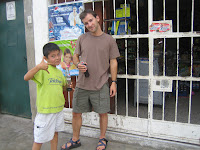A couple of weeks ago, I was in Trujillo for the
weekend getting my mail, going to the bank, and shopping. I learned one of my
host family relatives fell while riding his bike and was in the hospital with a
broken arm. It seemed like a common injury, but it was much more complicated
than we thought. Alex had surgery to place pins in his radius or ulna. After
almost a week of hospitalization, and poor healing, doctors ordered x-rays.
They determined the pins were poorly placed and he would need another surgery.
Upon exiting surgery he was allowed visitors. My host father Juan and I took
public transportation to pay him a visit. At this point most of the extended
family had been in and out of the hospital.
I said to Juan, “ I hope Alex has a TV." "I know I’d
be bored laying in bed for a week.”
The city hospital was nothing beautiful from the
outside. Most sections were in various states of construction. There was little
landscaping, not the kind of place you’d want to spend even a day, nevertheless
a week. The entrance- a chain-linked fence- was crowded and busy with angry
visitors. Some how we passed through seamlessly. As we winded through the
outside maze, passing ditches and incomplete projects; I thought about what my
experience would have been like had I been assigned as a Peace Corps volunteer
in a large city hospital. Would I have lasted this long?
The more I thought about it, the better my village
Carata seemed. We passed through an opening and entered the main entrance of
the hospital. Juan had visited before and knew exactly where his nephew Alex
was located. I followed behind, at a slower pace. I took in my surroundings,
looking at the walls, ceiling and tile floor of this cement jungle. Where was
all the staff? This place was right out of a movie. It was exactly how I
imagined health care in the early 20th century in America. Where was
Florence Nightingale when needed most?
How naïve was I to think 7 year old Alex had a TV
in his room! There was probably one TV in the whole building, if that. Coming
from Brigham and Women’s, Beth Israel and Boston Medical Center I definitely envisioned a
lower quality hospital from any in Boston. But this was more than just a downgrade! How in 2007 could
there be such stark differences between us and them? For heaven’s sake, Trujillo is the 2rd largest
city in Peru next to the capital! The floors we climbed and hallways we crossed were the least of my worries…
The third floor pediatric wing buzzed with infant’s
cries and children sobbing. In room A, no curtain separated the patients, nor was
there furniture. Save for a small bedside table at the headboard of the oversized
crib Alex lay in. He cried. He was not happy to see us, his pain was getting
worse and the IV medication was disconnected. His uncle consoled him, and
covered up his naked body with the adult size gown carelessly thrown over him.
Where was the sheet? His mother Yoli and Aunt Sabina entered the room, with
swollen eyes. I felt for the little guy, who was such a spitfire.
I overheard the nurse tell the family that the IV
solution they bought was not the right formula. They couldn’t hang it. It would
have to be returned. I leaned over to Juan and asked quietly, what was going
on. He explained that the family of the admitted patient had to purchase
everything themselves and bring it into the hospital so that the staff could
use it. Gauze, thermometers, IV tubing, solution, medications, bandages,
lotion, tape, toilet paper, casting materials, tissues, sutures, you name it.
What kind of absurdity! Can you imagine? Having to personally buy all
those supplies during a hospital stay? Most of the time it’s hard enough for
the family to emotionally deal with such a situation and on top of that they
have to finance the care, on the spot. Why can’t the hospital just bill the
family for everything they used? Imagine lay people buying medications, treatments
and supplies they’ve never heard of, or never used? It’s a recipe for disaster.
Moreover, an overtired nurse or doctor could easily administer an incorrect
medication! It goes against everything I ever studied in nursing school, all
the medical ethics I learned. And I thought the public health need was greater
in rural Peru.
A large green dinosaur was painted on the adjacent wall from Alex’s bed.
When the guard politely told us visiting hours were over, we left his bedside
to talk in the hallway. He had calmed down, and drifted off to sleep. I could
tell the hospitalization was wearing on his parents. Each of them took turns,
night after night sleeping on a broken loveseat, waking at all hours to check
on their son. In a hot, noisy, poor city hospital I wondered how anyone could
heal. The only intelligible sign of hope was the green brontosaurus with a
smile.
